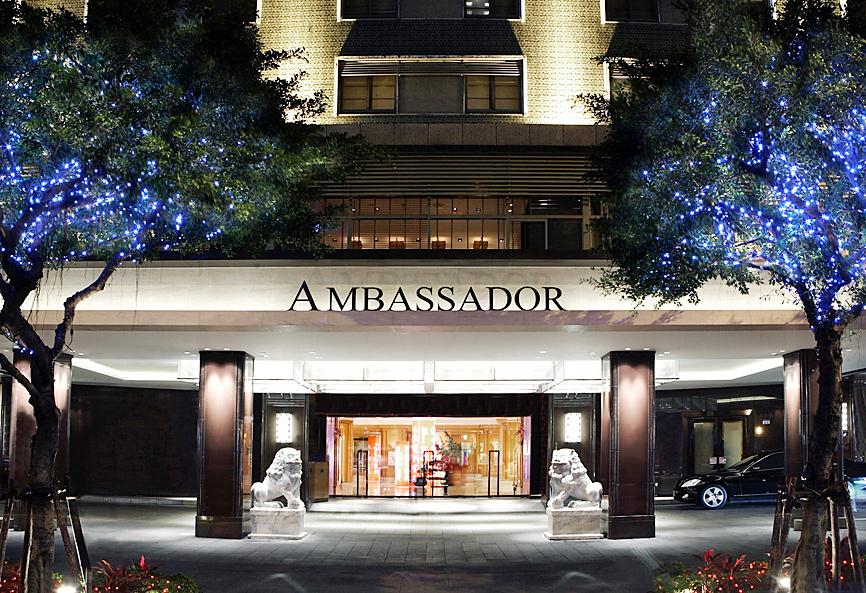Ambassador Hotels and Restaurants (國賓飯店) on Tuesday approved plans to seek urban renewal for its property in Kaohsiung, following a similar move last year for its flagship hotel in Taipei to cope with a business slowdown caused by the COVID-19 pandemic, the company said in a regulatory filing.
The hospitality provider, which ceased guestroom operations at Ambassador Hotel Taipei (台北國賓飯店) in July, said the 40-year-old Ambassador Hotel Kaohsiung (高雄國賓飯店) has been hit hard by border controls and social distancing measures.
Urban renewal would allow both properties to boost their floor area and value, the filing said.

Photo courtesy of Ambassador Hotels and Restaurants
Ambassador Hotel Taipei sits on a 1,454 ping (4,807m2) plot, making it the largest renewal project so far by measure of area, it said, adding that the company plans to build three high-rise buildings connected via the lower floors at the site.
One building would be reserved as an upscale hotel and the other two would house 76 luxury apartments, it added.
The company said it intends to invite Japan’s Palace Hotel Tokyo to operate the planned hotel in Taipei upon its completion and the two sides would sign a management contract in January next year.
Japanese travelers accounted for 70 percent of the clientele at Ambassador Hotel Taipei prior to the COVID-19 pandemic, the firm said.
The company said it would temporarily move its Cantonese and Szechuan restaurants, as well as its Michelin-starred A Cut Steakhouse at Ambassador Hotel Taipei, to a new mixed-use complex on Liaoning Street in February or March next year.
The company also owns Ambassador Hotel Hsinchu (新竹國賓飯店), whose operations have been unaffected, it added.
The company reported losses of NT$51.68 million (US$1.86 million) in the first three quarters of this year, or losses of NT$0.14 per share, company data showed.

GREAT SUCCESS: Republican Senator Todd Young expressed surprise at Trump’s comments and said he expects the administration to keep the program running US lawmakers who helped secure billions of dollars in subsidies for domestic semiconductor manufacturing rejected US President Donald Trump’s call to revoke the 2022 CHIPS and Science Act, signaling that any repeal effort in the US Congress would fall short. US Senate Minority Leader Chuck Schumer, who negotiated the law, on Wednesday said that Trump’s demand would fail, while a top Republican proponent, US Senator Todd Young, expressed surprise at the president’s comments and said he expects the administration to keep the program running. The CHIPS Act is “essential for America leading the world in tech, leading the world in AI [artificial

DOMESTIC SUPPLY: The probe comes as Donald Trump has called for the repeal of the US$52.7 billion CHIPS and Science Act, which the US Congress passed in 2022 The Office of the US Trade Representative is to hold a hearing tomorrow into older Chinese-made “legacy” semiconductors that could heap more US tariffs on chips from China that power everyday goods from cars to washing machines to telecoms equipment. The probe, which began during former US president Joe Biden’s tenure in December last year, aims to protect US and other semiconductor producers from China’s massive state-driven buildup of domestic chip supply. A 50 percent US tariff on Chinese semiconductors began on Jan. 1. Legacy chips use older manufacturing processes introduced more than a decade ago and are often far simpler than

Hon Hai Precision Industry Co (鴻海精密) yesterday said that its research institute has launched its first advanced artificial intelligence (AI) large language model (LLM) using traditional Chinese, with technology assistance from Nvidia Corp. Hon Hai, also known as Foxconn Technology Group (富士康科技集團), said the LLM, FoxBrain, is expected to improve its data analysis capabilities for smart manufacturing, and electric vehicle and smart city development. An LLM is a type of AI trained on vast amounts of text data and uses deep learning techniques, particularly neural networks, to process and generate language. They are essential for building and improving AI-powered servers. Nvidia provided assistance

Gasoline and diesel prices this week are to decrease NT$0.5 and NT$1 per liter respectively as international crude prices continued to fall last week, CPC Corp, Taiwan (CPC, 台灣中油) and Formosa Petrochemical Corp (台塑石化) said yesterday. Effective today, gasoline prices at CPC and Formosa stations are to decrease to NT$29.2, NT$30.7 and NT$32.7 per liter for 92, 95 and 98-octane unleaded gasoline respectively, while premium diesel is to cost NT$27.9 per liter at CPC stations and NT$27.7 at Formosa pumps, the companies said in separate statements. Global crude oil prices dropped last week after the eight OPEC+ members said they would